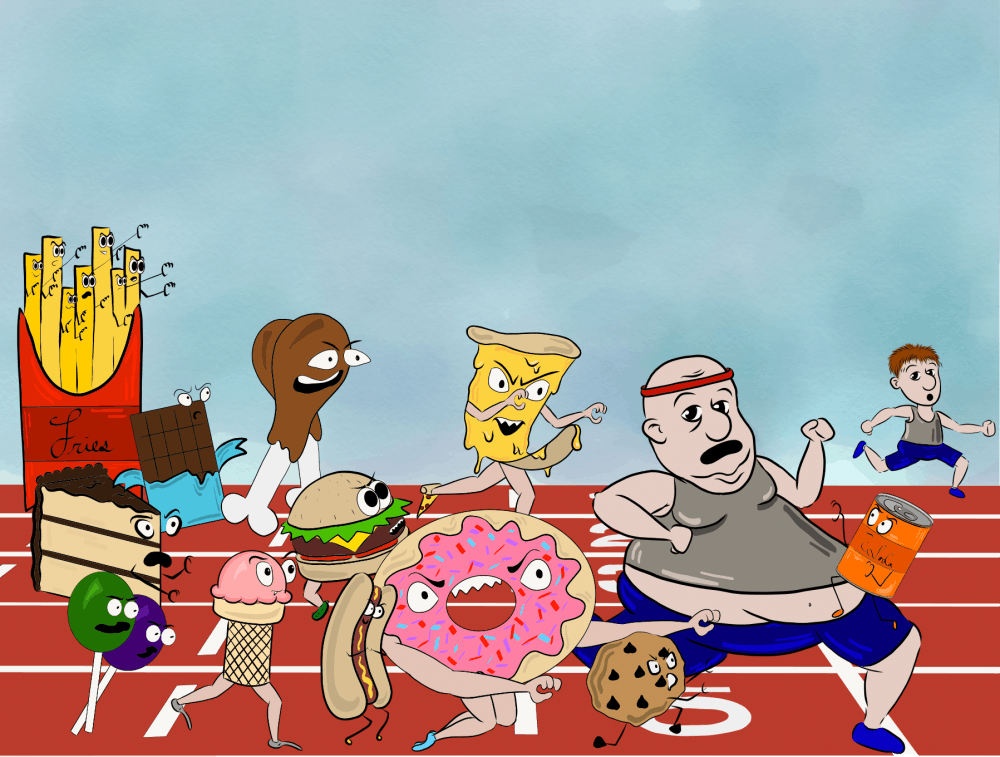It is common for college students to fantasize about having the perfect body, about representing the perfect image of health. Unfortunately, maintaining a healthy diet and exercise regiment is difficult.
Students have busy schedules that prevent them from working out regularly, and they also have easy access to cheap, processed foods. For some, an unhealthy lifestyle seems unavoidable.
Part of the problem exists due to the sheer accessibility of junk food. Every cafeteria has a line of pizzas that usually appears more appetizing than the salad bar, and the fact that so many fast food chains are within walking distance doesn’t help either. According to an Oregon State University study, most students fail to eat one serving of fruit or vegetables per day.
There are plenty of young adults in college who rarely work out, if at all. Many of those who do not focus on maintaining a healthy diet still look and feel great. They rarely get sick, and their bodies don’t reflect their lack of physical activity.
A lot of this is due to genetics — some people inherit genes that code for a quick metabolism and a resilient immune system. We have all heard the phrases, “I can eat whatever I want because I never gain any weight,” or “I need to eat this junk food now while I am young.” These arguments may work for the time being, but young adults don’t realize that what we put into our bodies now will affect us for the rest of our lives.
The unhealthy habits we establish now tend to follow us around for years to come. With age, the speed of our metabolism decreases significantly. By the time we are 25, which is around the time our bodies cease to grow bone, the speed of our metabolism decreases by two percent each decade, according to The Washington Post,. With age, we lose the ability to break down food, so it is important to establish a healthy routine now, before our unhealthy choices come to bite us in the butt.
"(The speed of your) metabolism is related to your point in life so metabolism is high when you're an infant and during growth spurts, so college students, especially those who are 17 or 18 and are going through growth spurts, have a faster metabolism," said Dr. Carol Johnston, ASU Nutrition Program director. "It is well documented that as you get older, your metabolism naturally slows down."
However, the time-sensitive argument in which people claim that we ought to eat junk food "while we still can," is faulty. The reality is, our bodies can only process foods to a certain extent. The body flushes out toxins and converts food into energy in an extremely efficient manner, but it can only handle so much.
Consuming processed foods, which are chemically altered in some way, can lead not only to short-term effects, but also to long-term illnesses that are proven to reduce a person’s longevity. In the short-term, an unhealthy diet can lead to stress and fatigue, but in the long-term, some experts predict that eating processed foods may lead to some forms of cancer as well as high cholesterol and blood pressure.
"You could say that you can eat whatever you want and never gain any weight," Johnston said. "That is one way of looking at things, but you also have to look at all the health implications of what you eat that are not related to weight. A lot of diseases take 10 to 20 years to develop, and it is hard to look that far forward into the future, but that is what you have to think about."
“There’s a huge adjustment that takes place when students leave home and come to college. It’s a very stressful and vulnerable time,” Dr. Rebecca Corwin, professor of nutritional sciences and neuroscience, said to Huffington Post.
Though most of us have been taught to eat healthy to prevent these long-term effects our whole lives, college students focus predominantly on what seems okay on the outside and fail to recognize the delicacy of the inner workings of the human body.
Perhaps it is a negligence that exists because we only focus on the near future. Regardless of the cause, these unhealthy habits will lead to detrimental health defects and possibly be responsible for a premature death.
"For a lot of people who have not come from families where there is not a lot of chronic disease," Johnston said, "they might not really understand the reality of how horrific it really is to have diabetes or to die at 40 due to a massive heart attack."
Editor’s note: The opinions presented in this column are the author’s and do not imply any endorsement from The State Press or its editors.
Want to join the conversation? Send an email to opiniondesk.statepress@gmail.com. Keep letters under 300 words and be sure to include your university affiliation. Anonymity will not be granted.
Like The State Press on Facebook and follow @statepress on Twitter.




